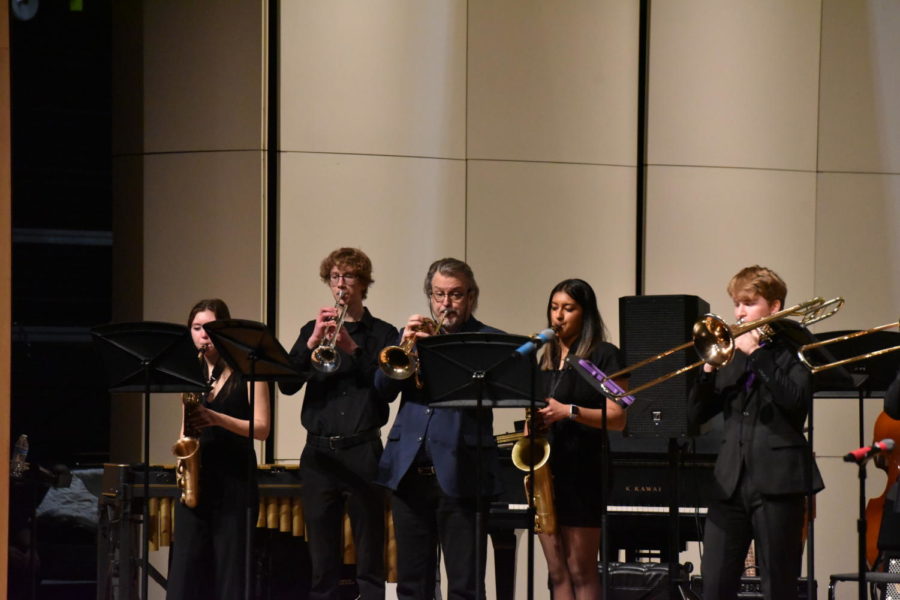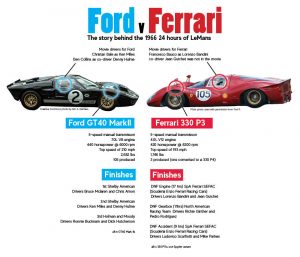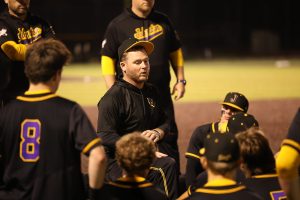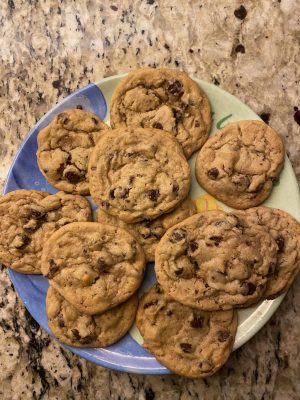The JHS Jazz Season in Black History Month
Upon the January 28 Jazz Showcase reminiscence rouses of the roots of Jazz and its cultural value to America.
February 6, 2023
“… One, two, three!” Band director Steve Kellar counts off before walking to the side of the stage for Jazz Syndicate to perform their first song, “Roll Em” by Mary Lou Williams.
Improv, syncopation (or accented notes that stray from the overall pattern), solos, call and response techniques and overall creative freedom are a few key elements that together compose the art of jazz.
Originating in Black communities during the late 19th century as stated by The Library of Congress, jazz is ascribed to Creole descendants and slaves (often from West Africa). The music genre mixes African American musical traditions with ragtime, marches, blues and so on. Throughout history, jazz has had the time to grow, develop and incorporate reflections and commentary of the many painful traumas experienced by the African American community.
Today, jazz is alive and well. In high schools all across the country, jazz bands show and play at concerts, festivals and competitions, and universities everywhere recognize the music genre to be studied. Cities too– feel, live and breathe jazz, just go to New Orleans, the home of jazz according to the National Park Service.
On January 28 at 5pm a jazz showcase took place in the JHS auditorium with free entry; the concert featured the three bands in order of: Jazz Combos, Jazz Nexus and Jazz Syndicate, as well as guest soloist David Kobberdahl. The concert took place four days before the start of Black History Month 2023, a federally recognized annual observance of the struggles and achievements of African Americans throughout history. With acknowledgement of the history of jazz, enjoying an artifact of culture in this way is a beautiful thing.
Combos members stood before their stands on stage in a straight line, saxophones, trombones, and trumpets in their hands. When the clock struck 5pm, Kellar, the director of Combos and Syndicate, turned to the audience in greeting and introduction.
“This group meets five times a week,” he said, listing off each day, “and of those they’re asked to come to at least one of those.”
Additionally, he stated they’re looking for a piano player and more trumpets to join the group. The first tune “Cold Duck Time” by Eddy Harris featured students Mikel Braddy ‘24, Hailey TeKippe ‘23, Finn Coons ‘23, Ben Herbst ‘23 and Ben Hansen ‘23. “St. “James” by Joe Primrose was the second song, a slow, smooth jazz, with solos from Braddy, Emma Romine ‘24, Coons, TeKippe, Akshara Eswar ‘24 and Hansen. Within each improvised solo, students took on their own musical style and playing demeanor. Romine, for example– holding her toes in the air, heel planted in the ground, and eyes closed, visibly feeling the warm sax sounds she played.
The third and final song from Combos was “Doxy” by Sonny Rollins. The students with special features were Braddy, Romine, Coons, Eswar and Herbst, with the guest appearance of David Kobberdahl. From what Kellar had seen of Kobberdahls’s work with the young musicians,
“He loves to play and he loves to teach.”
Kellar went on about the guest musician stating,
“He taught Valley jazz bands which if you know anything about Valley jazz bands are very, very, very good.”
Under the direction of Jason Heeren, Jazz Nexus was the next group to play. Instruments with a stage appearance included the vibraphone (“vibes”), piano, bass, guitar, drums, saxophone, trombone, trumpet and even flute.
The tunes they performed included: Charlie Parker’s “Now is the Time,” “Sin Palabras” by Rich Iaconna and “Things Ain’t What They Used to Be” by the jazz renowned Duke Ellington.
A Kobberdahl solo enhanced one of the final songs of each band. During “Things Ain’t What They Used to Be,” he slapped his trumpet down in the middle two musical phrases during a rest. He tilted his head, leaned forward and back, with eyes closed and eyebrows raised during his playing.
Soloists by students came from Elijah Caliger ‘23, Caleb Giddings ‘25, Jonah Rowland ‘25 and Tory Bishop ‘24 in the first tune. “Sin Palabras,” had solos from Siddarth Rajkumar ‘24 and Clark Armitage ‘25. Then the last tune featured Giddings, Caliger, percussionists, Armitage and Kobberdahl. Glowing squares of recording screens were sprinkled all around the room.
The last group, Syndicate kicked off performing “Roll ‘Em” and “Miss Missouri” by Benny Carter promptly after getting on stage. Soloists were Meredith Heggen ‘24, Hailey Akinsola ‘23, Meredith Downs ‘23, Eswar and TeKippe in the first piece. “Miss Missouri” featured TeKippe, Anita Dinakar ‘23, Heggen, Lauren Hendrickson ‘24 and Herbst.
Prior to performing the last two songs, Kellar introduced Syndicate and the remaining pieces: “Critics Choice” by Oliver Nelson Robets and “Libertango” by Aster Piarrolla and Fred Strum. Counting off on stage, trying to determine the number of soloists before moving on to the final songs Kellar playfully commented,
“Math is hard— jazz is hard.”
To conclude, Libertango opened with a flute and oboe duet from Dinakar and TeKippe. Other features were Eswar, Margi Skinner ‘24, and a closing thematic duet from Dinakar and TeKippe.
On April 5, Combos will perform their “first real gig” at Methodist Hospital. Additionally, parents and community members are encouraged to get in touch with Kellar ([email protected]) should they like to see the show Jazz Combos puts on. This Saturday Jazz Nexus and Jazz Syndicate will compete in the Jack Oatts Jazz Festival 2023, with more to come.
Ryan Nussbaum ‘23 is a trombonist for Nexus, but previously he played saxophone in Johnston jazz bands starting in 9th grade. He reflects on his experience over the years,
“Initially I started because Mr. Harris (the 8th grade band director) told me to. And I stay with it because the competitions and festivals are fun. … I like how it feels, how it sounds, and I like how it’s kind of a newer genre of music. I like how free it is.”






